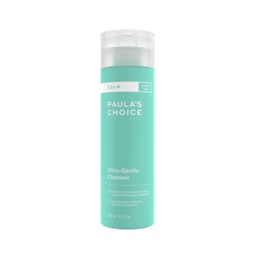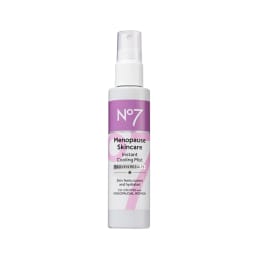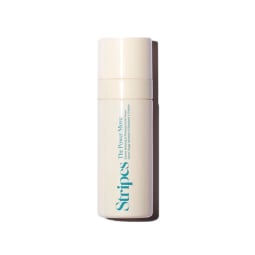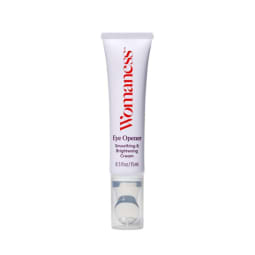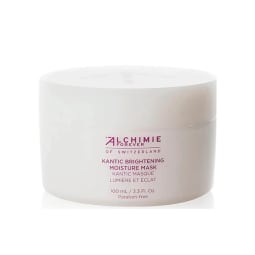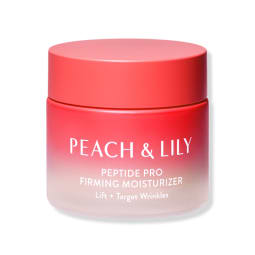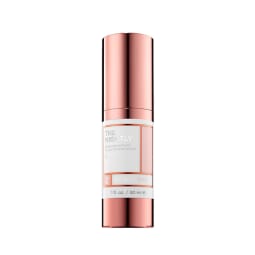Advertisement
Beauty Breakdown: Everything You Need To Know About Skin Care During Menopause

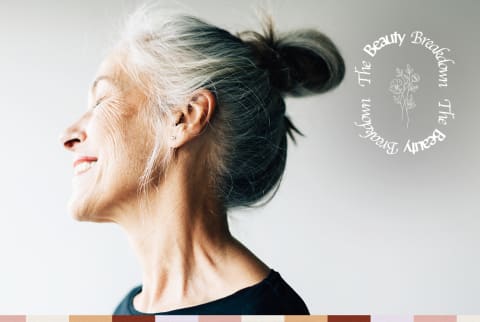
Half the population will go through menopause at some point in their lives—yet many still don't know what to expect or how to approach this stage of life. Menopause is a topic that rarely gets discussed (in the media, in the workplace, and in many health care settings), which can make these new experiences—from hot flashes to sleep troubles to skin concerns—even more difficult to navigate. That said, times are changing, and in the beauty space, we're starting to see way more education around menopausal skin care (plus sophisticated, elegant products you'll actually want to show off on your vanity).
In honor of World Menopause Month, we've decided to compile all of our hormone-led beauty tips in one, easily scannable breakdown. Of course, skin changes during menopause are very nuanced, as not everyone experiences these shifts in the same way or at the same time; diving into all the intricacies would take much more than a 2,000-word article (people write entire books on the subject!), but hopefully this guide gives you a jumping-off point.
Your skin evolves as you do—stay informed with these tips below.

The 101 on menopausal skin care.
To put it as simply as possible: Your sex hormones (like estrogen and progesterone) have a pretty big impact on your skin health—so when they start to decline during menopause, you may notice some structural skin changes as well. The most well-known shift is probably a lack of moisture, but menopause can also contribute to dullness, sensitivity, and even acne.
"As our hormones diminish in menopause, the functions they perform to maintain the health and vitality of the skin diminish as well, characterized by a change in sweat, sebum, and the immune functions resulting in significant alterations in the skin surface including pH, lipid composition, and sebum secretion," board-certified dermatologist Keira Barr, M.D., previously told mbg about menopause and skin. "These changes also provide potential alterations in the skin that may affect the skin microbiome."
Menopause is also famously associated with a drop in collagen: Your collagen levels naturally fall about 1% a year1 once you enter your 20s, but once you hit menopause, you experience a 30% drop in collagen in the first five years, with a 2% dip every year after that. Considering collagen is what literally holds your skin together (making it appear firm and taut), this stark decline can come with some notable changes—namely wrinkles and sagging.

The 6 things we're getting wrong right now.
Here are the major no's when it comes to caring for your skin during menopause:
- Using a stripping cleanser: During this time, you'll want to focus on balancing your microbiome and nix all stripping actives, lest you further dry out the skin. Cleansers tend to be the biggest culprits, as sulfate-laden formulas can rob your skin of all its good bacteria.
- Ignoring the early signs: "Sometimes people don't slow down enough to notice the changes that are developing in their skin during menopause," says board-certified dermatologist Sarv Zand, M.D., founder of Zand Dermatology and dermatologist advisor for Stripes. "For instance, even before changes start to develop in our facial skin, ankles and shins begin getting drier, and the skin of our heels can start to thicken in our 40s."
- Thinking you're done with acne: Yes, menopausal acne is a thing. See, when your estrogen2 drops, your skin is thrown into a state of confusion (since estrogen regulates much of your skin's behavior3). That, combined with shifting microflora and inflammation, can result in breakouts.
- Using harsh treatments: Another mistake? Treating those breakouts the same as you did in your teens. Menopausal acne is a whole different ball game.
- Ignoring your diet: We likely don't have to remind you that what you consume shows up on your skin, but during menopause, you'll especially want to prioritize anti-inflammatory, antioxidant-rich foods. "Typically, in gyno world, we recommend the Mediterranean diet," says OB/GYN Alyssa Dweck, M.D., on the mindbodygreen podcast.
- Doing too much: "Some women may think that because the skin is changing during menopause, a more intensive and complex skin care routine filled with abrasive exfoliants is needed. Truthfully, it is the opposite," notes board-certified dermatologist Joyce Park, M.D.

The 7 steps you need to know.
Here's how to care for your skin during this time of transition:
Strengthen your skin barrier.
A strong skin barrier is crucial for healthy skin—full stop. However, as we mentioned up top, your skin can become more sensitive during menopause, since diminishing hormones can alter your skin's pH. "Because the pH level of our skin changes at around age 50, skin becomes more sensitive, and women are more likely to develop rashes and easily irritated skin," says Barr. All that to say: Nurturing the skin barrier becomes even more important.
"Using fragrance-free products, with anti-inflammatory, moisturizing, and soothing properties is key to help maintain and restore moisture and the skin barrier integrity," Barr adds. Prioritize nourishing players like ceramides, fatty acids, and biotic ingredients.
Use collagen-stimulating actives.
At the same time, you'll want to fold in ingredients that promote your natural production of collagen—this is pretty critical, considering people experience a 30% drop in collagen4 when they hit menopause. Here, find a few expert favorites to help restore collagen:
- Retinol: "Retinol binds to retinoid receptors within skin cells," board-certified dermatologist Joshua Zeichner, M.D., tells mbg about the ingredient. This "activates genes that upregulate collagen production." It's arguably the most popular go-to for treating aging skin since plenty of research backs up its ability to increase collagen production in the skin5 and decrease the appearance of wrinkling.
- Glycolic acid: This AHA has been shown to increase collagen production6 when used topically, as it can trigger a restorative healing response in the skin, which spurs collagen production. Plus, it's a great treatment for menopausal acne: "I'm obsessed with the visible results that glycolic acid lotion gives the skin," says Zand. "During menopause, our pores don't empty as well and become more easily clogged, and so the skin on your chin and jaw becomes bumpy, and the pores on your nose and cheeks widen. Glycolic acid melts the debris inside your pores, making your skin smooth and your pores visibly smaller. The smoothing effect gives back your glow in place of dullness."
- Vitamin C: Vitamin C plays a significant role in the collagen synthesis process (your body cannot effectively produce collagen7 without the antioxidant!), as well as stabilizing the collagen you already have8. If you don't have a vitamin C serum in your line-up, find our favorite options here.
On that note, it's important to restore collagen from multiple angles—collagen supplements, for example, have been shown to promote your natural collagen and elastin production1, support skin elasticity and hydration levels, and enhance youthful texture. Here are our favorite options, if you're in the market.
Mind your diet.
"In my holistic cosmetic derm practice, we talk a lot about anti-inflammatory diets as a means of keeping our bodies as healthy as possible during times of transition," says Zand. "We recommend focusing on fish, salads, nuts, and veggies, and eliminating sugar, carbs, and dairy. We love supplementing with anti-inflammatory evening primrose oil, fish oils, biotin, and collagen daily for additional support."
You may particularly want to avoid diets high in refined sugar, which have been linked to hardening and fragmentation of collagen in the skin9. We also have a full guide to a collagen-supporting diet, if you'd like a specific grocery list.
Prioritize sun protection.
Considering your collagen levels decline by 30% once you hit menopause, you'll want to avoid degrading those levels even further, no? "Sun protection is critical since up to 80% of the signs of skin aging—including thinning and loss of elasticity—are due to UV damage," board-certified dermatologist Cynthia Bailey, M.D., founder of Dr. Bailey Skin Care, tells mbg about wrinkles.
Find a sunscreen you love and slather on. Make sure to look out for a broad-spectrum bottle that protects against both UVB and UVA rays—the latter can penetrate more deeply into the dermal layer and damage collagen; research has even found that UVA rays are the main contributor to photoaging10.
Find an exercise you love.
Say it with us: Exercise is skin care! "Exercise can be one of the best ways to reduce inflammation in your body, which is a contributor to the breakdown of collagen and elastin," says Barr about skin care in your 50s. Even if you haven't had a solid workout plan in the past, it's not too late: Research shows exercise can help reverse skin aging even in those who start an exercise regimen later in life. "It's not too late!" Barr adds.
Get some Zzz's.
Good sleep is crucial for healthy skin. While you snooze, the skin sees a surge in HGH (human growth hormone), which helps rebuild body tissues and spurs increased cell production to replace cells naturally lost throughout the day. Translation? Sleep gives your skin time for cellular rejuvenation, and research has even found a link between shut-eye and collagen production11. Losing sleep, on the other hand, increases the stress hormone cortisol, which breaks down collagen.
And as integrative medicine doctor Suzanne Gilberg-Lenz, M.D., previously told mbg, "Sleep disruption is one of the most common complaints of those going through menopause, affecting at least 40 to 60% of us." If you're struggling to fall and stay asleep, see here for expert tips to get quality rest, plus our list of favorite sleep aids.
Honor the transition.
"Slow down and honor your body's changes," advises Zand. "What a delightful time to sink into the yumminess of self-massage. Delight your legs and feet with a one-minute oil rub before getting all the way into bed. Self-care at this stage lands with more gratitude than guilt or nuisance. Cultivate it."
Not to mention, that massage has some impressive skin care benefits: As your age, your body may need a little help encouraging circulation and blood flow to the face, and research shows that daily facial massage can improve skin tone, elasticity, and overall skin health12. Regardless, it just feels heavenly—use this time to connect with your body.

3 extra ideas—in case you want to go all out.
Looking to go above and beyond? I applaud your determination! Here are some extra tips to supercharge your healthy aging skin routine:
- Nourish from the knees down: Remember when we told you to look out for the early signs? Well, for many, those structural skin changes tend to begin from the knees down. "Even before changes start to develop in our facial skin, ankles and shins begin getting drier, and the skin of our heels can start to thicken in our 40s," says Zand. "This is easily remedied by massaging in a moisturizing cream or oil daily, particularly after bathing."
- Apply moisturizer in the shower: "I love life hacks that make self-care easy and convenient," says Zand. So to soothe dry, itchy skin, she chooses to apply body lotion in the shower. "I apply it to my wet skin before I towel dry. It takes under 30 seconds, so I never skip it. My towels aren't slimy, and my heels are oh-so-happy."
- Try red light therapy: Experts frequently tout red light therapy for stimulating collagen production. "[It goes] deep into the dermis layer and is great for healthy aging, targeting wrinkles and fine lines," master esthetician Sarah Akram once shared with mbg. One study even found that patients receiving red light therapy on their face twice a week for 30 total sessions experienced improved skin complexion13, skin tone, skin smoothness, and collagen density (as measured with an ultrasonographic test). Feel free to check out our favorite red light therapy devices for an at-home treatment.

Best menopausal skin care products:
Pros:
- Contains mild surfactants that clean without stripping skin
Cons:
- Does not remove waterproof makeup
Actives:
GlycerinCoconut-derived surfactantsIf you're looking for a creamy, fragrance-free cleanser (whether you're going through menopause or not), please do yourself a favor and snag this gentle wash. It was specifically formulated for sensitive, reactive, or compromised skin types, which makes it a great grab for anyone prone to irritation. It's effective at dissolving daily grime, yet it leaves your skin feeling supple (never stripped!) post-rinse.
Pros:
- Instantly cools and soothes flushed skin
Cons:
- Some might not prefer a rose scent
Actives:
GlycerinRosewaterAccording to Park, this spritz is perfect for relieving hot flashes. The entire No7 menopause range was co-created with over 7,000 menopausal women, and 92% of those women said this mist made their skin feel instantly cool, even when using during a hot flash. "This cooling facial mist also contains rosewater and glycerin to help hydrate and soothe the skin," says Park.
Advertisement
Pros:
- Visibly plumps skin
Cons:
- Pricey
Actives:
Hyaluronic acidEcotineSqualanePoria cocos mushroomThis hydrating serum from Naomi Watts' new line became an instant hit among beauty folk. With five (yes, five) different sizes of hyaluronic acid, the formula plumps every layer of your skin and also includes ecotine, which is an innovative yet underrated ingredient to strengthen the skin barrier and soothe dehydrated skin. Finally, you'll find squalane and a mushroom extract to keep the skin oh-so-supple.
Pros:
- Brightens, lifts, and de-puffs
Cons:
- Pricey for a small size
Actives:
Hyaluronic acidBakuchiolFilmexelAlong with hyaluronic acid and bakuchiol (which is often referred to as a gentler version of retinol), this eye cream includes a red algae and tara fruit complex called Filmexel—it creates a film-forming "second skin" on your under-eyes and instantly lifts and fills in fine lines. Plus, the cooling metal applicator can help soothe and de-puff a swollen eye area.
Advertisement
Pros:
- Rich and moisturizing
- Calms irritation
Cons:
- Does contain some fragrance
Actives:
GlycerinOat extractMicaGrape extractBilberry fruit extractPansy extractVitamin CHolistic esthetician Elle Feldman once called Alchimie Forever's Kantic cream "a miracle worker for aging and sensitive skin," and their antioxidant-rich mask packs even more of a punch. It includes oat extract to soothe and moisturize parched, irritated skin, as well as mica to encourage an instantly brighter appearance. As the brand suggests, leave it on the skin overnight as a sleeping mask—your skin will thank you.
Pros:
- Smooths wrinkles without irritating the skin
Cons:
- Some reviewers say it's too oily for daytime use
Actives:
SqualanePeptidesPolyglutamic acidRice fermentGlyceryl glucosideTremella mushroomTurmericPhytosterylGive me a moment to gush about this star ingredient list: There are 12 signal and carrier peptides paired with four amino acids to visibly smooth wrinkles and lines; hyaluronic acid, polyglutamic acid, rice ferment, and glyceryl glucoside for long-term hydration; and squalane, tremella mushroom, turmeric, and phytosteryl for soothing skin barrier support. It's a firming, hydrating all-star, and it's specifically marketed toward those with mature skin (although, anyone can use it). It's truly a next-generation wrinkle cream.
Advertisement
Pros:
- Simultaneously treats acne & fine lines
Cons:
- Pricey
Actives:
Hyaluronic acidPeptidesRetinolWhen it comes to treating menopausal acne, you should look for options that are gentler on the skin (no more going to town with peels and exfoliators!). Seek actives buffered by hydrating actives, like this BeautyBio serum: Along with retinol (which addresses acne and wrinkles), it includes hyaluronic acid and a proprietary peptide complex to help encourage hydration and collagen production.

The beauty breakdown.
Your skin ages as you do, and once you hit menopause, your complexion undergoes quite a shift. While dryness and collagen loss are often the main talking points, many people experience dullness, sensitivity, and acne, too. The bottom line? Try to treat your skin with as much patience and kindness as you can; on the road to true skin longevity, there are no quick fixes.
Meet The Experts
13 Sources
- https://www.ncbi.nlm.nih.gov/pmc/articles/PMC3583892/
- https://pubmed.ncbi.nlm.nih.gov/11705091/
- https://pubmed.ncbi.nlm.nih.gov/15948678/
- https://www.ncbi.nlm.nih.gov/pmc/articles/PMC2685269/
- https://www.ncbi.nlm.nih.gov/pmc/articles/PMC2699641/
- https://www.ncbi.nlm.nih.gov/labs/pmc/articles/PMC7891644/
- https://lpi.oregonstate.edu/mic/health-disease/skin-health/vitamin-C
- https://www.nature.com/articles/s41598-020-72704-1
- https://pubmed.ncbi.nlm.nih.gov/20620757/
- https://pubmed.ncbi.nlm.nih.gov/25234829/
- https://www.nature.com/articles/s41556-019-0441-z
- https://www.ncbi.nlm.nih.gov/pubmed/12121555
- https://www.ncbi.nlm.nih.gov/pmc/articles/PMC3926176/
